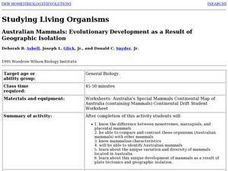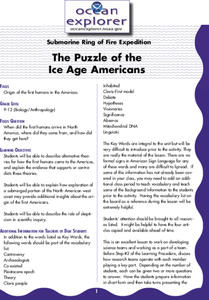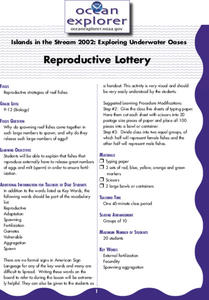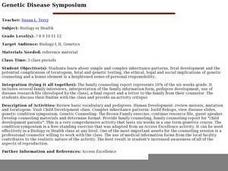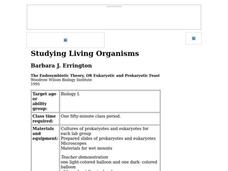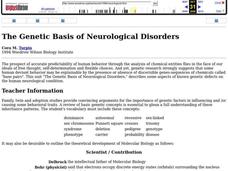Curated OER
Australian Mammals: Evolultionary Development as a Result of Geographic Isolation
Students examine the differences between monotremes, marsupials, and placental mammals and are able to contrast these organisms with other mammals. They learn about unique variation and the diversity of mammals located in Australia.
Curated OER
A Walk in the Woods
Eighth graders observe and identify the different levels of the forest. In this forest zones lesson students observe, identify and name a variety of forest components and describe how humans impact the forest ecosystem.
Curated OER
Cell Cycle Portfolio
Students work together in groups to complete various stations on the cycles of cells. Individually, they keep their completed work in a folder after following specific instructions on how to complete each experiment. They use the...
Curated OER
An Automobile Phylogenetic Tree
Students construct a phylogenetic tree for various automobiles and trucks after considering important characteristics of these "organisms". They work in small groups to construct the trees and complete a set of questions then they...
Curated OER
An Automobile Phylogenetic Tree
Students study a list of cars and trucks and think about characteristics that can be used to show an "evolutionary relationship". From the characteristics they identity, students construct a phylogenetic tree to show how the automotive...
Curated OER
The Puzzle of the Ice Age Americans
Learners describe alternative theories for how the first humans came to the Americas, and explain evidence that supports or contradicts these theories. They examine the role of skepticism in scientific inquiries.
Curated OER
Hardy-Weinberg Equilibrium According to Hoyle:
Students gain a feeling for the significance of the Hardy-Weinberg Equilibrium without using algebra but participating in an interactice game.
Curated OER
Individualism
Pupils demonstrate knowledge of the understanding of American individualism, specifically four areas: decision making, expressing opinions, competition, and obligation.
Curated OER
Hardy-Weinberg Equilibrium According to Hoyle: OR, Population Genetics or Platypapyrus foursuitii
Students use this exercise to help achieve a working knowledge of the Hardy-Weinberg Equilibrium without recourse to algebra. After participating in this activity, students gain a feeling for the significance of the Hardy-Weinberg...
Curated OER
From the Gulf of Mexico to the Moons of Jupiter
Young scholars compare deep ocean conditions to those found on the moons of Jupiter. In this Earth science lesson, students consider the possibilities and conditions needed to support simple life. Young scholars examine the habitats and...
Curated OER
Seals, Corals, and Dollars...
Students explore the interdependence of animals and their habitat. In this Hawaiian ecology lesson, students work in groups to research the necessity of preserving precious coral as a habitat for monk seals. Students prepare and share...
Curated OER
Reproductive Lottery
Students explain that fishes that reproduce externally have to release great numbers of eggs and milt (sperm) in order to ensure fertilization.
Curated OER
Genetic Disease Symposium
Students research simple and complex inheritance patterns, fetal development and the potential complications of teratogens, fetal and genetic testing, and the ethical, legal, and social implications of genetic counseling.
Curated OER
Culture Everywhere
Students study their culture while filling in a chart that shows how culture meets basic human needs. They examine the role of archaeologists in studying people from past cultures.
Curated OER
Studying Living Organisms
High schoolers are introduced to Hardy-Weinberg Equilibrium without recourse to algebra. After participating in this activity, students gain a feeling for the significance of the Hardy-Weinberg Equilibrium without using algebra.
Curated OER
Fish Parasite Survey
Students count nematodes, cestodes and crustaceans on approximately one-hundred and fifty fish. They fill out autopsy reports for external and internal parasites then complete and discuss guide questions to make inferences about parasite...
Curated OER
Studying Species By Examining the Evolution of the Canidae Family
Students read an article on the characteristics of wolves and dogs then complete a phylogenetic tree of the canid family. They then write an essay justifying why or why not wolves and dogs should be classified as different species.
Curated OER
Time Conceptualization
Young scholars relate the number and length of generations in their living family members to the number of generations that have passed since specific events in recorded history. They then apply this time conceptualization to the number...
Curated OER
Fish Parasite Survey
Students survey and dissect as many fish as possible. They count nematodes, cestodes and crustaceans on the fish, fill out autopsy reports, and transfer data to a chalkboard data table. Students graph the results of the entire class...
Curated OER
The Genetic Basis of Neurological Disorders
Learners explore neurological disorders. They examine the presence and absence of discernible genes. Students describe neruological diseases and draw faces of affected persons. They play a human neurology disorders learning game.
Curated OER
Observing Osmosis in a Chicken Egg
Tenth graders develop a hypothesis and explain what they observed on an activity. In this investigative lesson students observe osmosis and report their data using a graph.
Curated OER
Reef Fish Real Estate in the South Atlantic Bight
Students research a species of reef fish to determine its habitat requirements as both a juvenile and an adult. They use this information to create a pamphlet in the style of a real estate brochure that describe the habitat and food...
Curated OER
Radiation
Students distinguish between natural and man-made radiation. They measure radiation using a Geiger counter and investigate footprints of radiation.
Curated OER
Land Use Issues
Students observe and describe the properties of rocks and their significance relationship in the environment. They explain the implications of destroying habitats and the importance of rebuilding them.
Other popular searches
- Plant Biology Vocabulary
- Biology Vocabulary Words
- Ap Biology Vocabulary
- Biology Vocabulary Genetics
- Biology Vocabulary Review
- Biology Vocabulary Lessons
- Biology Vocabulary 98
- Biology Vocabulary Prefixes
- Biology Vocabulary Bacteria
- Biology Vocabularyv 98


